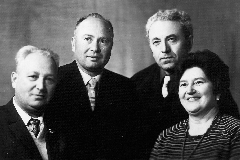
Arkadii Vayspapir
Arkadiy Vayspapir was born in 1921 in the Jewish agricultural colony of Bobrovyi Kut in Kherson Oblast. He completed his studies at the local high school with distinction.
In 1938, Arkadiy's father, Moisey, was arrested and executed due to a false denunciation (he would be posthumously rehabilitated only after Stalin's death in 1953). Being forced to provide for his family, Arkadiy joined a tractor brigade.
In 1940, Arkadiy Vayspapir was drafted into the Red Army. In late June 1941, during the very first weeks of the Soviet-German War, Sergeant Arkadiy Vayspapir was assigned to the defense of Kiev as a squad commander. In September of that year, Vayspapir was seriously wounded in one of the fierce battles that raged over the city, and taken prisoner. He was transported to Belorussia, ending up in a POW hospital in Minsk. In March 1942, following a routine inspection, the Nazis imprisoned Vayspapir, as a Jew, in the punishment cell of a concentration camp in Minsk. Fortunately, thanks to his physical strength he was spared the gas van, being instead assigned to heavy and dirty jobs at the camp.
Eventually, Arkadiy Vayspapir, together with other inmates, was transported from Minsk to the Sobibor death camp, where, in 1942 and 1943, the Nazis murdered more than 200,000 persons. A group of inmates in Sobibor formed an underground resistance cell, planning to stage an uprising and escape from the camp. They were joined by newly arriving POWs. The combat group, led by Alexander Pechersky, drew up a plan, according to which the participants in the uprising – having armed themselves with knives and axes, acting either singly or in small groups – were to eliminate the camp leadership, seize the armory, kill the guards, and escape. On October 14, 1943, Arkadiy Vayspapir teamed up with Yehuda Lerner, a 17-year-old Jew from Warsaw. Using axes that had been obtained in advance, they killed two SS officers in the tailors' workshop. A total of 15 guards were eliminated. The Nazis, having apparently sensed the danger, opened fire. Pechersky's group returned fire, enabling the others to cut through the fence and escape. Approximately 80 inmates were shot during the escape attempt. Those remaining in the camp, about 150 persons, were killed on the very next day. A total of about 320 inmates managed to flee into the woods, but many of them were later caught – either by the Nazis who were hunting for them, or by local residents. Only about 50 persons survived the ordeal. Shortly after the successful uprising, the Sobibor camp was completely demolished on Himmler's orders.
Arkadiy Vayspapir managed to evade his pursuers and, after an arduous trek through the woods, he joined a partisan unit, where he served as a machine gunner. Later, he was reinstated in the Red Army, becoming commander of a reconnaissance company.
Because of the time he had spent in German captivity, Arkadiy was awarded only the medal "For Courage", and received no further decorations. Unfortunately, former POWs were met with official scorn in the postwar Soviet Union, and the heroic deeds of the inmates of Sobibor were not publicized.
Arkadiy's entire family died in the war: His brother was killed in action, while his mother, younger sister, and other relatives were murdered by the Nazis and their collaborators in Bobrovyi Kut in 1941.
After the end of the war, Vayspapir moved to Zaporozhye, where he graduated with distinction from the Industrial Institute. Afterward, he worked at various times as chief engineer at a spare parts factory and as department head at the Office of Regional Economic Councils. In 1994, the Vayspapir family settled in Kiev.
For a long time, the survivors of Sobibor, who were "fire-forged friends", would hold a reunion every five years. Alexander Pechersky passed away in 1990. Another participant in the uprising, Semyon Rozenfeld, moved to Israel in the same year.
Arkadiy Vayspapir died in Kiev in 2018, shortly before his 96th birthday.






